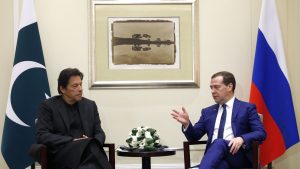Ties between Pakistan and Russia date back to the Early Modern period, when the Muscovite Tsar Ivan the Terrible and his successor Alexis I expressed an interest in opening trade relations with the subcontinent (including parts of modern-day Pakistan). After the formalization of diplomatic relations between the two nations in 1948, the history of Soviet-Pakistan, and subsequently Russia-Pakistan, relations has been characterized by distrust and mutual competition. Pakistan’s close ties to America and the West during the Cold War, culminating in the Soviet invasion of Afghanistan, meant both countries continued to view each other with hostility and distrust. Russia’s continuing support for India, both before and after the Cold War, including its frequent arms deals with New Delhi, have done little to improve bilateral ties between Moscow and Islamabad.
However, in recent years, Russia and Pakistan have put aside some of these differences and the COVID-19 pandemic could accelerate this process of reconciliation. In the recent past, natural disasters have acted as a catalyst for closer ties. In the wake of the devastating earthquake in 2005 that ravaged northern Pakistan, Russia was one of the first to provide assistance to Islamabad. Shortly thereafter, a Russian trade delegation visited Pakistan and overall bilateral trade rose by $270 million and subsequently by $520 million while Russian energy giant Gazprom signed a Memorandum of Understanding with the Pakistani Ministry of Petroleum and Natural Resources. After the 2010 floods in Pakistan, Russia again offered assistance and humanitarian aid, leading to President Vladimir Putin’s public endorsement of Pakistan joining the Shanghai Cooperation Organization. An official visit by Russian Foreign Minister Sergey Lavrov to Islamabad soon followed. Aside from economic and political ties, there was also an improvement in cultural ties and the “softer” aspects of diplomacy, including the publication of the world’s first bilingual Urdu-Russian dictionary. These gradual improvements then led to the Friendship Drills carried out between the Pakistani and Russian armies, a step that would have seemed impossible a decade before.
Could the COVID-19 pandemic serve to further cement ties between the two nations, in the same way other natural disasters have? Or will some of the historical problems that have plagued the relationship in the past continue to hinder tangible progress in the future? The answer lies somewhere in between the two.
The Pakistani ambassador to Russia, Shafqat Ali Khan, has recently explored the possibility of purchasing ventilators from Moscow to help Pakistan’s fragile healthcare system deal with COVID-19. Although he stressed that Pakistan has no immediate intention to ask Russia for help, the mere suggestion that Pakistan may look to Russia for support is revealing. He also suggested that if Islamabad were to ask Moscow for help in tackling the outbreak, “Russia will be the first country to offer assistance.” In addition, Khan also expressed his desire to extend people-to-people contact between the two nations, including the possibility of sending more Pakistani students to Russia to study in prestigious Russian universities. Meanwhile, the last Friendship Drill between the two countries took place just last year, and after the coronavirus pandemic it is likely we will see their resumption.
Pakistan’s friendship with Russia has been and may continue to be strengthened by its improving relationships with former Soviet countries, particularly those with strong ties to Putin. In 2019, Pakistan-Belarus bilateral political consultations took place and a number of Belarusian companies were invited to invest in Pakistan’s growing textile, food processing, and agriculture sectors. Some of the softer aspects of diplomacy were also apparent, with Belarus even commissioning a commemorative stamp to celebrate friendly relations with Pakistan. Islamabad’s desire to court favor with Russia’s allies could bring the two countries closer together, something that may continue in the wake of COVID-19.
However, it would be over-simplistic to assume that the pandemic and Pakistan’s apparent interest in developing closer ties with Russia to help fight the outbreak will be enough to strengthen Islamabad’s relationship with Moscow. After the previous two natural disasters, bilateral trade increased, but is still far below where it should be. And Russia’s continued support for its traditional subcontinental ally, India, also continues. Just last month, India’s ambassador to Russia, Bala Venkatesh Varm, said he expected Russia’s planned delivery of the S-400 air defense system to be take place on time despite the global pandemic, something that will do little to please Pakistan’s Prime Minister Imran Khan. Furthermore, Russia is also committed to supplying India with three more Kilo-class submarines.
Of course, India is not the only thorn in the side of Pakistan-Russia relations. Pakistan’s continued refusal to recognize Armenia, one of Russia’s closest allies, is another point of contention between the two. Pakistan’s stance on Armenia is unlikely to change anytime soon, and Islamabad’s commitment to Armenia’s adversary, Azerbaijan, continues to strengthen. In fact, just this month, Pakistan’s President Arif Alvi held talks talks with his Azeri counterpart, Ilham Aliyev, discussing the possibility of further cooperation in the wake of the COVID-19 pandemic.
Previous natural disasters have served to bring Pakistan and Russia closer together and Ambassador Khan’s assertion that relations are at their “strongest point” has a factual basis. However, Russia’s continuing support for Pakistan’s historic adversary and Pakistan’s refusal to recognize one of Moscow’s closest allies could hamper bilateral progress. However, if Pakistan does ask Moscow for help in tackling the coronavirus, this will not only be revealing in itself, but will also provide the opportunity for further mutual cooperation.
Shahid Hussain completed his undergraduate and master’s degrees at University College London (UCL) and will be pursuing a Ph.D. at UCL focusing on Early Modern diplomacy.

































